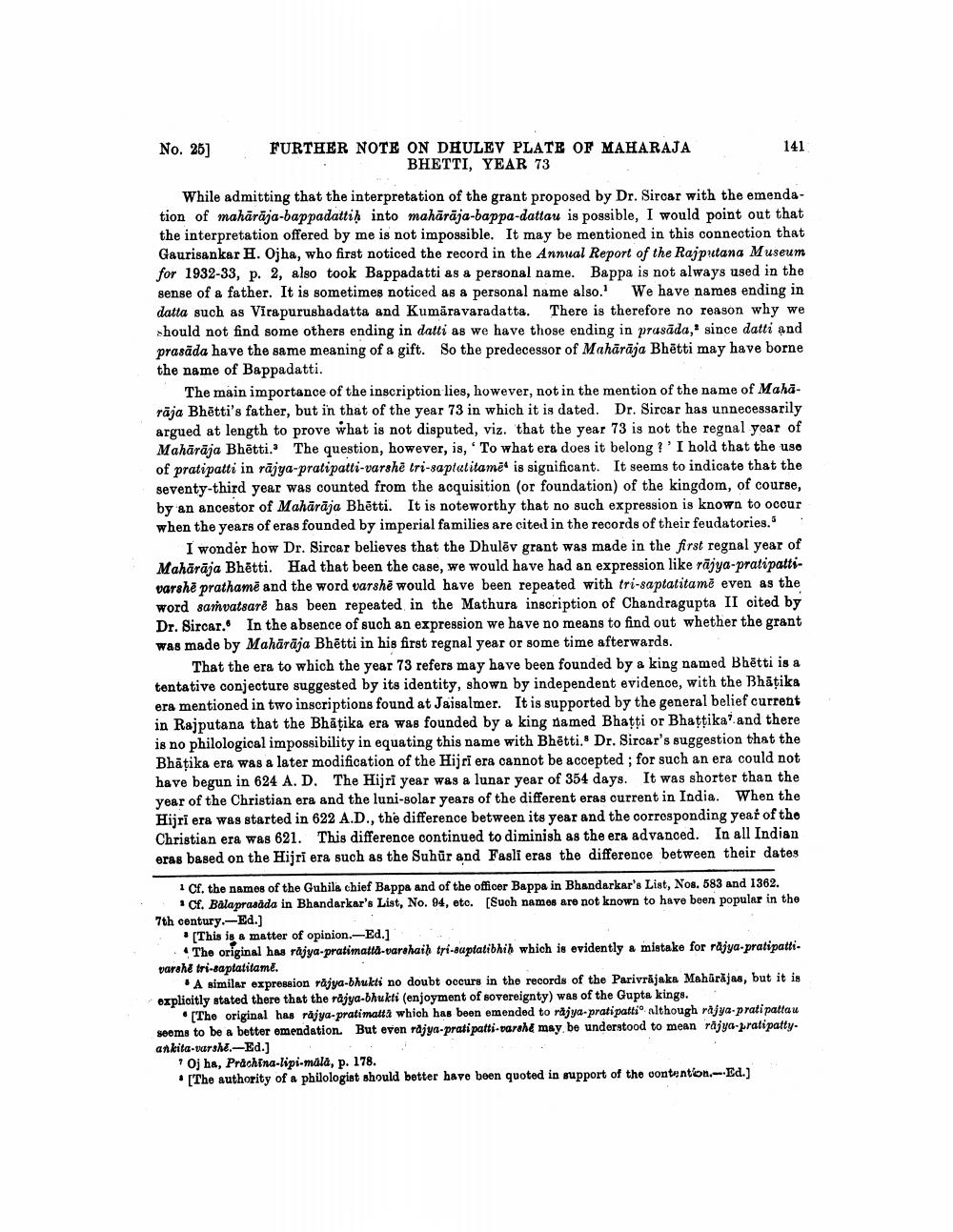________________
No. 25]
FURTHER NOTE ON DHULEV PLATE OF MAHARAJA BHETTI, YEAR 73
141
While admitting that the interpretation of the grant proposed by Dr. Sircar with the emendation of mahārāja-bappadattiḥ into mahārāja-bappa-dattau is possible, I would point out that the interpretation offered by me is not impossible. It may be mentioned in this connection that Gaurisankar H. Ojha, who first noticed the record in the Annual Report of the Rajputana Museum for 1932-33, p. 2, also took Bappadatti as a personal name. Bappa is not always used in the sense of a father. It is sometimes noticed as a personal name also.1 We have names ending in datta such as Virapurushadatta and Kumāravaradatta. There is therefore no reason why we should not find some others ending in datti as we have those ending in prasada, since datti and prasāda have the same meaning of a gift. So the predecessor of Mahārāja Bhetti may have borne the name of Bappadatti.
The main importance of the inscription lies, however, not in the mention of the name of Mahārāja Bhetti's father, but in that of the year 73 in which it is dated. Dr. Sircar has unnecessarily argued at length to prove what is not disputed, viz. that the year 73 is not the regnal year of Mahārāja Bhētti. The question, however, is, ' To what era does it belong?' I hold that the use of pratipatti in rajya-pratipatti-varshe tri-saptatitame is significant. It seems to indicate that the seventy-third year was counted from the acquisition (or foundation) of the kingdom, of course, by an ancestor of Mahārāja Bhetti. It is noteworthy that no such expression is known to occur when the years of eras founded by imperial families are cited in the records of their feudatories."
I wonder how Dr. Sircar believes that the Dhulev grant was made in the first regnal year of Mahārāja Bhetti. Had that been the case, we would have had an expression like rajya-pratipattivarshe prathame and the word varshe would have been repeated with tri-saptatitame even as the word samvatsare has been repeated in the Mathura inscription of Chandragupta II cited by Dr. Sircar. In the absence of such an expression we have no means to find out whether the grant was made by Mahārāja Bhetti in his first regnal year or some time afterwards.
That the era to which the year 73 refers may have been founded by a king named Bhetti is a tentative conjecture suggested by its identity, shown by independent evidence, with the Bhātika era mentioned in two inscriptions found at Jaisalmer. It is supported by the general belief current in Rajputana that the Bhaṭika era was founded by a king named Bhatti or Bhaṭṭika" and there is no philological impossibility in equating this name with Bhetti. Dr. Sircar's suggestion that the Bhatika era was a later modification of the Hijri era cannot be accepted; for such an era could not have begun in 624 A. D. The Hijri year was a lunar year of 354 days. It was shorter than the year of the Christian era and the luni-solar years of the different eras current in India. When the Hijri era was started in 622 A.D., the difference between its year and the corresponding year of the Christian era was 621. This difference continued to diminish as the era advanced. In all Indian eras based on the Hijri era such as the Suhur and Fasli eras the difference between their dates
1 Cf. the names of the Guhila chief Bappa and of the officer Bappa in Bhandarkar's List, Nos. 583 and 1362. Cf. Balaprasada in Bhandarkar's List, No. 94, etc. [Such names are not known to have been popular in the 7th century.-Ed.]
[This is a matter of opinion.-Ed.]
The original has rajya-pratimatta-varshaih tri-suptatibhih which is evidently a mistake for rajya-pratipattivarshe tri-saptatitamē.
A similar expression rajya-bhukti no doubt occurs in the records of the Parivrăjaka Mahārājas, but it is explicitly stated there that the rajya-bhukti (enjoyment of sovereignty) was of the Gupta kings.
[The original has rajya-pratimatta which has been emended to rajya-pratipatti although rajya-pratipattau seems to be a better emendation. But even rajya-pratipatti-varshe may be understood to mean rajya-pratipattyankita-varshe.-Ed.]
"Oj ha, Prachina-lipi-mälä, p. 178.
1
[The authority of a philologist should better have been quoted in support of the contention.-Ed.]




